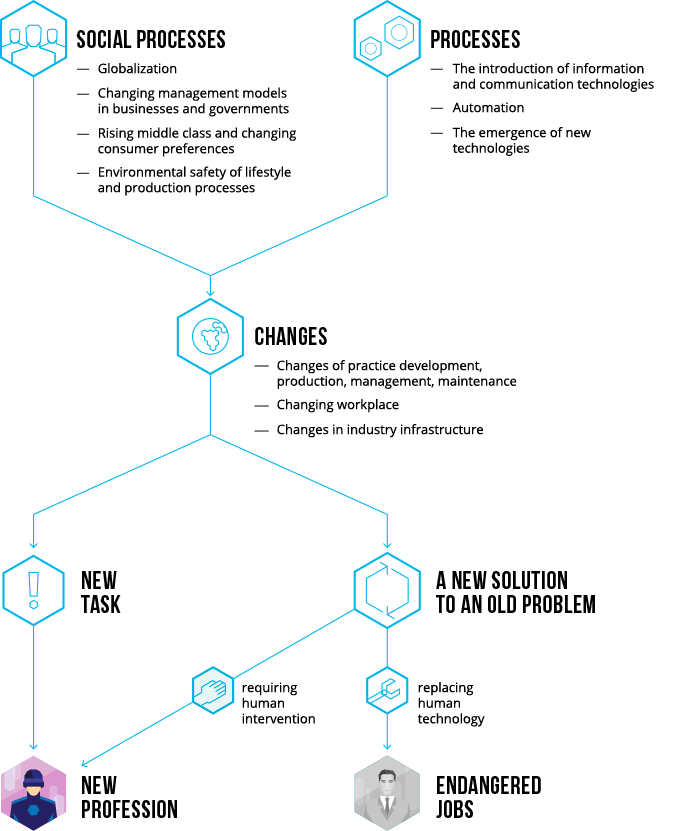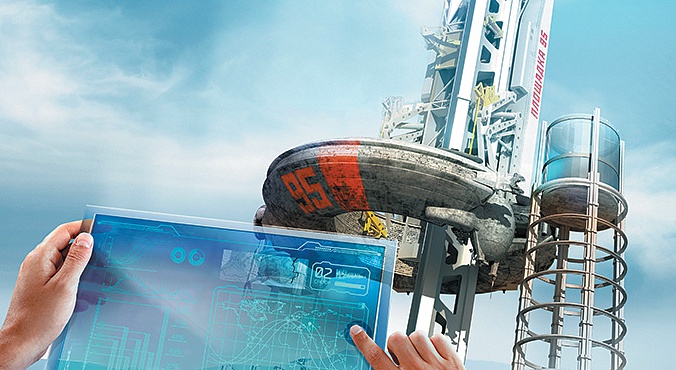The future of the labour market
TRENDS IN LABOUR MARKET

The world through the eyes of the jobs of the future
Profession-Retired — 57 professions
ACCOUNTANT
Special software already allows a novice to learn basic operations in audit and accounting fairly quickly. In the future, software will be able to replace people completely.
QUANTITY SURVEYOR
Tasks performed by specialists in this occupation are being entirely taken over by intelligent software. The volumes and complexity of data are growing, and man is finding it difficult to process them quickly and to a good quality standard. In the next five to seven years, the number of specialists required will decrease rapidly, while their functions will be limited to maintaining intelligent software and systems performing cost estimates.
CREDIT MANAGER
It is already possible for people to apply for loans online. In the future, special computer software will make lending decisions upon retrieving information about the potential borrower from Big Data systems.
STATISTICIAN
In the future, the collection, processing and structuring of data will dramatically increase in complexity due to growing data volumes. The existing knowledge and skills will not be sufficient for it, and statisticians will be replaced by Big Data specialists.
SHORTHAND TYPIST/ TRANSCRIPTIONIST
Even now speech-to-text systems (e.g. Yandex.Diktovka) allow replacing this type of employee. Technology is advancing so fast that by 2017 this type software will be used everywhere.
COPYWRITER
Computer software (bots) connected to huge databases containing texts, articles, manifestos, literary works, etc. are already capable of generating medium-quality texts of required literary forms on any subject, by using standard syntactic structures.
PROOFREADER
Automatic systems for text revision will appear, taking into account all grammar and spelling rules of a language. Spelling and punctuation can already be checked in an MS Word document or a browser. These programmes are not impeccable now, but with the progress of semantic text analysis technologies they will be able to replace humans in the near future.
PHOTO EDITOR
Very soon, people will not be no longer needed to search for illustrations for a publication. A convenient algorithm for photo and image search in the Internet will allow authors to deal with texts, images and videos.
SCENIC CARPENTER
Modern computer graphics can produce any backdrop, from a pristine jungle to a Gothic castle. Why having to deal with pavilions when you can draw an entire 3D city? Therefore, scenic carpenters will only be left in theaters, being replaced by computer graphic designers in the cinema.
LIBRARIAN, RECORD KEEPER/ARCHIVIST
Digitizing all libraries and archives, with 24/7 access to any information from any part of the world, is producing a revolution in the archive and library segment. Librarians and archivists as we know them will disappear, whereas archive management as an activity will move to network-based media.
LECTURER
The tasks of “loudspeaker” teachers will be altered by the progress of educational technologies and changing requirements of students, as writing down dictated standard lectures reduces motivation for studying, any information can be found in the Internet, while the world’s leading schools offer various free and paid online certification courses to all those willing. Lecturers should give students unique experience that they cannot obtain anywhere else. Eventually, lectures will be read only by those who possess unique knowledge or are able to relate to the audience and can present information in an artistic manner.
TRAVEL AGENT
There are several factors killing the job. More and more often, people prefer to travel by themselves rather than in a group, and a spontaneous holiday is preferred to an accurately planned one; Abundant internet services and applications for finding transfer, accommodation and leisure planning (at no commission fee, with 24/7 access) allow users to organize their leisure without intermediaries. The job will disappear as increasingly more people learn to organize their own tours with the help of the Internet. In the future, travel agents will only remain in the premium segment, where a real person – rather than a programme – working with the client will be especially valued.
STUNT PERFORMER
There is no more need to perform real head-spinning stunts. Thanks to computer video processing, an actor without special physical training can jump out of a speeding train or weather a turbulent waterfall. Today’s stunt actors are becoming a sort of circus performers in special shows.
TEST ENGINEER
Robotic complexes, simulators and computer modelling can substitute humans in many tests of various complexity and hazard level. The job of a test engineer will become an exotic phenomenon over time.
LEGAL ADVISER
Answers to common questions can be found in Q&A sections of most legal portals, necessary documents are easy to find in databases, and legal advice can be obtained in a community or from an expert. Online advice will be needed in much fewer cases, significantly decreasing demand for this type of specialists.
NOTARY
Development of remote access services for obtaining documents and banking transactions using a digital signature, possibility to connect to databases to check identity, solvency or obtain a police certificate are making the functions of a notary obsolete. The job may only remain due to requirements of obsolete legal norms.
BANKING CLERK
Nearly all banking transactions are moving to the Internet and are becoming as close as possible to the user, while cash can be collected in significant amounts from an ATM. Within the next 10 to 15 years, the remaining banking clerks will only serve clients who fail to adapt to new technologies.
REAL ESTATE AGENT
Internet services allow finding properties with any parameters anywhere in the world, without leaving home; payment transactions are also made via the Internet, eliminating commission fees. As in the case with travel agents, real estate agents will remain mainly in the premium segment, where personal contact with the client is important.
TOUR GUIDE
Individual programmes will replace standard tours, and human guides will be replaced by their virtual counterparts and special tourist software and applications that help find one’s bearings in a location and obtain necessary information on the subjects of the user’s interest.
ANALYST
Intelligent systems are already able to perform analytical tasks in various fields, This is especially true for standard and repetitive operations. Eventually, analytical services will be replaced with services based on artificial intelligence.
JOURNALIST
Speech-to-text and text writing software enables automating and accelerating this previously creative job. For example, Bloomberg has replaced part of its news writing staff with an AI application that writes trading news faster and more creatively than human reporters. Amateur reports and blogs, quickly rising in popularity thanks to their liveliness, honesty and naturalism, are competing with TV, radio and press journalists of the leading mass media. In 20 years, artificial intelligence will take over 95% of tasks connected with mass media. Journalists’ main job will be literary journalism, built upon the author’s original views and approach, close to fiction or films.
SPORTS ANALYST
The ability to memorize and compare the details of sports biographies and match results of ten years ago, to analyze information and forecast possible outcomes of future games was irreplaceable in a pre-computer era, but in the near future computers will manage this task perfectly.
SECRETARY/PERSONAL ASSISTANT
Computer software will be able perform most functions of a secretary, i.e. dispatch calls, make up schedules, plan meetings, book air tickets for business trips, etc. Already there are programmes able to take up part of them. The challenge is to develop an optimal solution combining as many functions as possible.
GOVERNMENT SERVICE OPERATOR
The emergence of services such as Government Services Portal or Electronic Government, as well as civil crowd sourcing, is transforming the job of a municipal worker, at least reducing the number of document handling employees.
TRANSLATOR/INTERPRETER
Semantic translation software is developing faster than ever, with simple technical translation performed automatically even today. These solutions are already able to translate both written and oral speech. Since the technology continues to develop, the niche of human translation will remain only for highly qualified specialists who perform highly complicated or literary translation.
LOGISTICS EXPERT, CONTROL ROOM OPERATOR
Transport infrastructure is becoming more complex, cargo delivery is becoming module-based, freight and passenger flows are growing, and user requirements to the quality and speed of delivery are increasing. These tasks are becoming more and more difficult for a human to perform. However, automated freight control and tracking systems are being implemented, with all kinds of sensors and satellite monitoring capabilities, and intelligent software for delivery routing and tracking. Humans are only needed for control at the highest level, i.e. decision making in case of emergencies. This is why in the job of a control room operator and logistics expert the number of employees will gradually reduce and the complexity of their work will increase.
DIAGNOSTICIAN
Mobile diagnostic devices and automated expert systems are gradually replacing the functions of this specialist. Even now, the AI-based system IBM Watson can diagnose dangerous diseases, such as cancer, with an accuracy several times higher than that offered by an experienced diagnostic doctor. Within the next five years, the microdiagnostic devices market will grow rapidly: in any conditions and at any time, people will be able to have their physiological parameters scanned and immediately transmitted to a particular doctor via the Internet. Primary diagnostics at clinics and hospitals will also be performed by special equipment with intelligent software. In 15 to 20 years, the need for new diagnosticians will be quite low. Specialists that will appear in the next five to ten years will be enough to satisfy the need for these professionals when the specialty becomes obsolete across Russia before 2030.
SYSTEM ADMINISTRATOR
AI systems will allow eliminating system failures quickly and almost imperceptibly for the user. Traditional system administrators are being replaced by software and specialists for its adjustment.
NAVIGATOR
The basic functions of this professional, which are to lay the route, calculate and mark the progress on a map, can already be performed by GPS navigators.
PHARMACIST
Many pharmacies are beginning to use internet resources, as a significant portion of buyers can select their own medications in the Internet, either on their own or at the recommendation of a doctor. Logistic services can deliver an order at any time of day. Pharmacists will remain either to provide medications in case of emergency, or to provide services to people who cannot care for themselves. There will be very little need for pharmacists after 2020.
Ticket inspector
Ticket inspectors are already a form of honorary retirement. By the late 2010s, most people will have electronic cards to pay at automated scanners when entering buildings and transport, when visiting
events, etc.
Watchman
Automatic keys, retina and fingerprint scanners used for security purposes in offices and residential premises are gradually replacing these workers. In developed countries, watchmen have already become a rarity, and in the next five to seven years the job will disappear from large Russian cities.
Elevator repairman
Increasingly more automated engineering solutions for repairing and servicing elevators and intelligent control systems are gradually replacing this job.
PARKING VALET
Increasingly more producers add intelligent parking systems to their basic versions of cars, thereby automating the tasks performed in thejob. After 2020, AI will control 80% of new cars. Parking management is also being automated, with the function being performed by surveillance cameras, automatic barriers and parking meters.
CALL CENTRE OPERATOR
Simple communicator software is already able to answer mass user questions. Further development of technology will replace humans with intelligent software that will generate answers to any question on a particular subject, based on a database.
POSTMAN
Correspondence is moving to the digital space, and deliveries are made by forwarding companies. Automated postal offices are gaining popularity in developed countries. The job of postman will gradually become history, remaining more as a curiosity for tourists (much like horse cart drivers).
HIGHLY QUALIFIED AGRICULTURAL WORKER
Abundance of automated robotic complexes and control systems used in various agricultural activities is leading to humans being pushed out of the agricultural sphere. This process has been taking place for decades and shows no signs of stopping.
COURIER
Courier drones are gradually entering the market. In the Aviation section, we have shown examples of successful application of unmanned flight technologies in delivery services. Drones make deliveries faster and environmentally safer, since most of them are powered by electricity and do not pollute the environment.
MUSEUM ATTENDANT
Automatic security systems will look after public order, while special applications will help visitors find their way in the galleries. Museum attendants may remain only to create a specific atmosphere.
FREIGHT TRAIN DRIVER
Every year, unmanned control systems become ever more sophisticated. First of all, they will be installed in metro and freight trains, with human intervention only in case of emergency. After 2020, an autopilot on a freight train will become an industry standard.
TRAFFIC OFFICER
The development of intelligent traffic control systems (traffic lights, guard rails, surveillance cameras, wireless connection to any vehicle, etc.) will eventually lead to the full automation and robotization of this specialty.
SECURITY GUARD
Security standards will change and smart automated control systems will replace traditional solutions in security. Information on several facilities will be sent to a single control room, while immediate response teams will resolve situations that cannot be managed by computer systems. This is why small private security firms will no longer be needed. Besides, the functions of a security guard can be performed by a drone equipped with a video camera and motion and heat sensors.
MINER, MINING ENGINER
These blue-collar jobs are disappearing due to the increasing complexity of geological survey and mining processes (and therefore their gradual robotization) and the declining demand for mined raw materials.
PACKER, WELDER
In the next 10 to 15 years, this professional of the food and chemical industry will begin to be replaced by robotic systems that improve the intensity, safety and quality of production. In 20 to 25 years, capabilities of bio-3D printing will move production processes to users’ homes, where the latter will be able to print any food or chemical products, buying only the formula and suitable powders for printing.
DRILLER
Conditions of producing minerals and energy are growing in complexity, as easy-to-reach resources are coming to an end. In the future, drilling will be performed in areas difficult or impossible for people to work in (Extreme North, offshore areas, etc.). The advance of robotics and satellite control systems allows removing man from the production cycle, while increasing the volumes and intensity. The romantic job of a driller will be replaced by a drilling robot operator, often able to work remotely.
FOREMAN
The job will be gradually replaced with a foreman watcher (see Part I, Construction).
TRANSPORT TERMINAL WORKER
Already there are information robots that help passengers find their way in terminals, and special machines, such as cleaners or towing vehicles, are becoming more and more automated. In the future, they can be controlled remotely, allowing airports and railway stations to be managed with a lot fewer staff.
SEWING MACHINIST
The advance of cheap 3D printing will enable producing clothes and footwear quite quickly, at home and to preset parameters. A sewing machinist will be hired rather as a quite expensive specialist for custom one-time jobs. See more in the Light Industry section.
PORTER
At the Japanese airport Kitakyushu, there are already robot porters that can carry luggage of up to 50 kg and react to voice commands. U.S.-based Five Elements Robotics has invented the personal robot helper Budgee which can carry various weights after its owner, e.g. things purchased in a household appliance store. These technologies are developing and getting cheaper fast, and humans cannot compete with the robots in speed and stamina.
CONCRETE WORKER
Proliferation of 3D printing and other innovative construction techniques will reduce the need for working hands at a construction site. Traditional blue-collar jobs will be driven out by operators of construction 3D printers and other equipment.
DRY CLEANER’S WORKER
Robotic dry cleaning shops are already used to clean automobile interiors, while the company White Conveyors, specializing in highly sophisticated means for sorting and storing clothes, offers an automated dry cleaning system where clients can bring and take back their things through a special terminal, with a smart conveyor minimizing human interference. Thus, there will be no more need for human workers.
WAITER
Robotic waiters are widely used in Japanese restaurants. However, since communication is an important part of the service in this job, robots will replace humans in chains where the most important are speed and accuracy of the order, but not in high-class restaurants.
COACH
“Technical” coaches helping sportsmen train certain moves (e.g. kicking the ball) will not be needed in the future, as the coach will only have to look after an athlete’s physical shape and the choice of the right game strategy. And sports robots and trainers will help sportsmen train jumping and serving techniques.





























